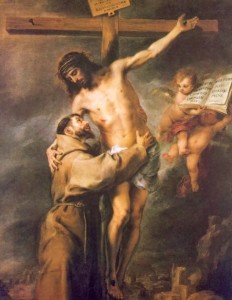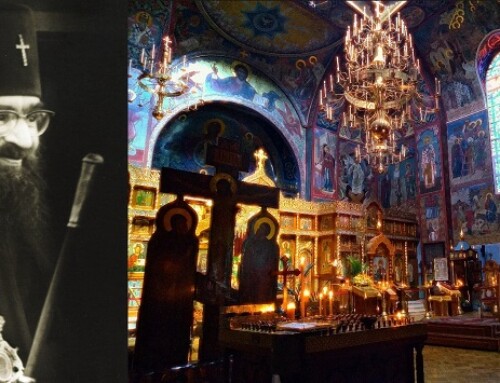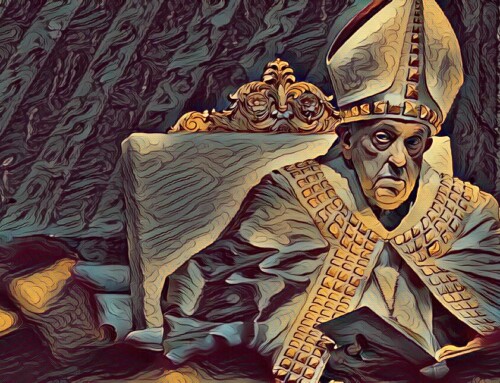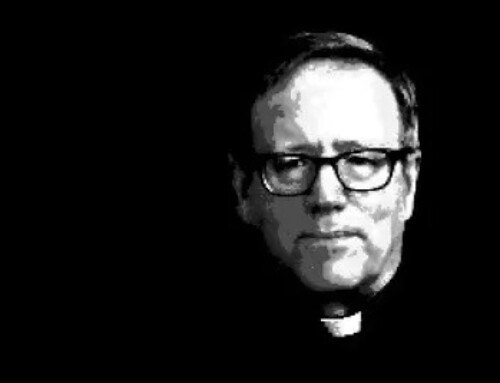
“Christ on the Cross,” (above) Pietro da Cortona: 1661 and “St. Francis of Assisi embracing the crucified Christ,” (left) Bartolome Murillo: 1668-69.
“Our Lord proclaimed through St. Matthew: ‘My yoke is sweet and my burden light’ [Mt. 11:30], the burden being the cross. If individuals resolutely submit to the carrying of the cross, if they decidedly want to find and endure trial in all things for God, they will discover in all of them great relief and sweetness. This will be so because they will be traveling the road denuded of all and with no desire for anything. If they aim after the possession of something, from God or elsewhere, their journey will not be one of nakedness and detachment from all things, and consequently there will be no room for them on this narrow path nor will they be able to climb it.”
Once returning to the world, after my self-imposed exile from California and the pornographic gay community I once loved, I quickly stumbled and fell. I had become frustrated that God did not immediately fulfill all of my long-unrealized desires and that He didn’t miraculously heal every wound that had ever been inflicted upon me. I had gotten angry, and was turning for comfort from others. That night, when I looked at the crucifix around my neck: I wondered about my relationship with Jesus. Where was He? And where did I stand? Then, I began to think back upon one of my favorite Saints from the Holy Scriptures – St. Mary Magdalene. In a sense, she had become my first spiritual model: the former sinner who stood at the foot of the Cross. And, that was precisely it: the foot of the Cross. Was that the place to which I was being called? At the Cross, would my life make sense?
When Jesus was arrested, tried, tortured, ridiculed, and marched to his death: the only remaining faithful were His Holy Mother, the virginal St. John, and the former harlot Mary Magdalene. The Apostles, including the rough-and-tumble masculine St. Peter, had all cut and run. The only ones who did not flee were the humble, pure, weak, penitent, and forgiven. Because of their presence, they were called into a deeper-union with Christ: to suffer (along with Him) every outrage, scourge, and injury. It’s a singular position of honor, but it is also an ugly and messy place. At Calvary, there is blood, sweat, guts, spittle, and dirt. To stand along with Christ, we must be willing to join our lives with His; and not just on Easter Sunday, but on Good Friday as well. And, that scared me. For, no one wants to be mocked, spit upon, slapped, beaten, and then publicly hung on a cross to die. And, here, standing off to the side: I could only smell the rot and not the roses.
Because when we are invited to be with Christ, at his most painful and vulnerable moment – we are truly on the most intimate terms with Our Lord and this can bring about an extremely exquisite and blissful sense of peace. This is brilliantly portrayed in some of the depictions associated with the life of St. Francis of Assisi. But this proximity, taken to its limit, as with Francis, and later with Padre Pio, can become so locked that the person takes on the physical manifestation of the Passion. So, I started slowly, as a Catholic, I had a very vague familiarity with “The Stations of the Cross.” I went to a local religious store, bought a small 1 dollar booklet by St. Alphonsus Liguori, and headed to a church. It was dark, deserted, and quiet: silently, I followed Jesus on His journey to death. With every step, I came to know Him more and more. It’s a simple prayer, but it was a revelation. Every Friday, I would take that trip with Our Lord; and gradually, I began to join my sufferings with His: I gave all my pain, hate, disappointment, failures, and longings to Him; and, in turn, I felt His pain as well. I revealed all to Him; and He became my best friend, my confidant, and my Savior.
Only, to arrive at this point, like Christ, we must be stripped of our garments; St. John of the Cross refers to this process as “nakedness” of spirit. In my next blog, I will begin an exploration of what John of the Cross taught on this very important aspect of the spiritual life.






This information is invaluable. Where can I find out more?
Feel free to surf to my webpage – coupon codes